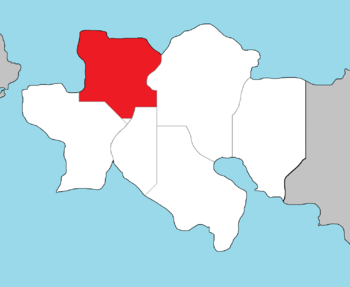Alcaria
The Province of Alcaria | |
|---|---|
|
Flag | |
 Alcaria highlighted in Keflistan | |
| Capital | Joliette |
| Largest city | Lafayette |
| Official languages | French, English |
| Demonym(s) | Alcarécois |
| Government | |
• Governor | Durward Fabian |
| Legislature | Alcaria Provincial Assembly |
| Establishment | |
• Colonized by Kingdom of Cartier | 1522 |
• Province of Autonomous Keflistan | 1575 |
• Provincial Government ratified 2020 Constitution | December 1st, 2020 |
| Area | |
• Total | 246,886 km2 (95,323 sq mi) (5th) |
| Population | |
• 2015 census | 7,731,974 |
| GDP (nominal) | 2015 estimate |
• Total | $87 Billion |
• Per capita | $11,293 |
Alcaria is one of the 6 Provinces of Keflistan. It is bordered to the south by Calmont, and the Keflistan Federal District, west by the Bay of Lafayette, north by the Cortesia Ocean, and east by Tecali, and Vitoria. Alcaria is Keflistan's second smallest province by area, but second most populous. It is the only province to have a predominantly French-speaking population, having been colonized by Cartier in the 16th Century. Most inhabitants live in urban areas near along the coast and in the Kefli City Metropolitan Area in the southeastern corner of the province. English-speaking communities and English-language institutions are concentrated in the southeastern portion of the province, and the population gradually switches from French majority to English Majority as you move southeast. The province's substantial natural resources have long been the mainstay of its economy.
Law and government
Administrative divisions
Alcaria is divided into 102 parishes (the equivalent of counties in most other provinces).
Most parishes have an elected government known as the Parish Council. It is the legislative and executive government of the parish, and is elected by the voters. Its members are called Councilors, and together they elect a president as their chairman.
A more limited number of parishes operate under home rule charters, electing various forms of government. This include mayor–council, council–manager (in which the council hires a professional operating manager for the parish), and others.
Civil law
The Alcaria political and legal structure has maintained several elements from the times of colonization. One is the use of the term "parish" (from the French: paroisse) in place of "county" for administrative subdivision. Another is the legal system of civil law, as opposed to common law.
While the Alcaria Civil Code of 1575 has been continuously revised and updated since its enactment, it is still considered the controlling authority in the province. Differences are found between Alcaria civil law and the common law found in the other province. While some of these differences have been bridged due to the strong influence of common law tradition, the civil law tradition is still deeply rooted in most aspects of Alcaria private law. Thus property, contractual, business entities structure, much of civil procedure, and family law, as well as some aspects of criminal law, are still based mostly on traditional legal thinking.
Law enforcement
Alcaria's provincial police force is the Alcaria Highway Patrol. It began in 1919 with the creation of the Highway Commission. In 1927, a second branch, the Bureau of Criminal Investigations, was formed. In 1932, the Provincial Highway Patrol was authorized to carry weapons.
On July 28, 1946, the two branches were consolidated to form the Alcaria Department of Law Enforcement; its motto was "courtesy, loyalty, service". In 1982, this office was abolished and became a division of the Department of Public Safety. In 1988, the Criminal Investigation Bureau was reorganized. Its troopers have statewide jurisdiction with power to enforce all laws of the province, including city and parish ordinances. Each year, they patrol over 12 million miles (20 million km) of roadway and arrest about 10,000 impaired drivers. The Highway Patrol is primarily a traffic enforcement agency, with other sections that delve into trucking safety, narcotics enforcement, and gaming oversight.
The elected sheriff in each parish is the chief law enforcement officer in the parish. They are the keepers of the local parish prisons, which house felony and misdemeanor prisoners. They are the primary criminal patrol and first responder agency in all matters criminal and civil. They are also the official tax collectors in each parish. The sheriffs are responsible for general law enforcement in their respective parishes.
Judiciary
The judiciary of Alcaria is defined under the Constitution and law of Alcaria and is composed of the Alcaria Supreme Court, the Alcaria Circuit Courts of Appeal, the District Courts, the City Courts, and the Parish Courts. The chief justice of the Alcaria Supreme Court is the chief administrator of the judiciary. Its administration is aided by the Judiciary Commission of Alcaria, the Alcaria Attorney Disciplinary Board, and the Judicial Council of the Supreme Court of Alcaria.
Economy
Alcaria has an advanced, market-based, and open economy. Like most industrialized countries, the economy of Alcaria is based mainly on the services sector. Alcaria's economy has traditionally been fuelled by abundant natural resources, a well-developed infrastructure, and average productivity. The provinces GDP in 2020 was $87 billion.
The mining industry accounted for 6.3% of Alcaria's GDP. It employs about 50,000 people in 16 companies.
The pulp and paper industries generate annual shipments valued at more than $14 billion. The forest products industry ranks second in exports, with shipments valued at almost $11 billion. This industry employs 68,000 people in several regions of Alcaria. This industry accounted for 3.1% of Alcaria's GDP.
Agri-food industry plays an important role in the economy of Alcaria. It accounts for 8% of the Alcaria's GDP and generate $19.2 billion. This industry generated 487,000 jobs in agriculture, fisheries, manufacturing of food, beverages and tobacco and food distribution.
Transportation
The Alcaria Department of Transportation and Development is the provincial government organization in charge of maintaining public transportation, roadways, bridges, floodplain management, port facilities, commercial vehicles, and aviation.


